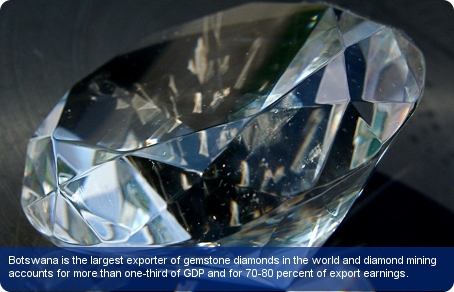Find a business in Botswana

Botswana is one of Africa’s big post-colonial success stories and now has a GNI per capita of US$7,650 (2012). Its stable social and political structure has brought stability to the economic and business environment; GDP has grown 2.8% per annum (2008-12). Botswana has a wealth of natural resources but its economy is dependent on mining and agriculture and has to deal with frequent droughts.
The country’s economy is founded on cattle ranching and mining. Diamond mining accounts for more than one-third of GDP and for 70-80% of export earnings. Tourism, financial services, subsistence farming, and cattle ranching are other key sectors.
The secure and stable political and economic climate attracts travel and tourism, which directly contributed 2.4% of GDP in 2011 and generated 3.1% of total employment (World Travel and Tourism Council). The country promotes sustainable eco-tourism and places a high priority on the protection of Botswana’s game reserves and national parks, such as Central Kalahari Game Reserve, Chobe National Park and Kgalagadi Transfrontier Park.
The mining sector, in particular diamond mining, dominates the economy. Minerals such as diamonds, copper and nickel generate the most income and Botswana is among the largest producers of diamonds in the world. But it has no known oil or gas reserves of its own.
Since attaining independence in 1966 it has maintained one of the highest economic growth rates in the world and in the process has transformed itself from one of the poorest countries to a middle-income country.
The state is landlocked and therefore relies on an extensive railway network, international airport, and road transport links through South Africa to move goods around.
Land in and around the capital, Gaborone, can be owned by foreigners, but there are restrictions on foreign ownership of community- and state-owned land. Since the 1990s, Botswana has encouraged foreign investment in export-led industries. English is the language most likely to be used in professional and business life.
In the World Bank’s ‘Doing Business 2012’ study, the landlocked state was ranked 54th out of 183, placing 22nd best in the world for paying taxes. Botswana enjoys the best credit rating in Africa. These rankings measure the conduciveness of a regulatory regime in starting and operating a business.
However, Botswana has high unemployment (estimates range between 24% and 40% depending on the source) and suffers from the second highest HIV/AIDS infection rate in Africa. The advent of the disease has led to a critical shortage of skilled workers, although adult literacy is high for an African country at 83% (2006). The country is politically stable and has had an unbroken record of parliamentary democracy since independence. But its reliance on diamond mining in its economy leaves it vulnerable to global downturns, as seen in 2009, and it is also strongly influenced by economic trends in South Africa, the economic giant of the region.



